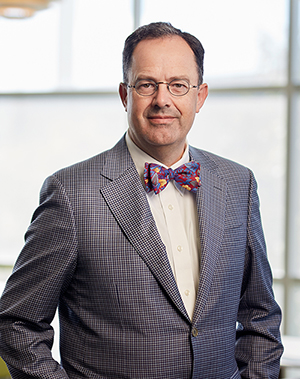Every time I see the striking new mural in the Brodie Centre atrium – pictured on the cover of this issue of RadyUM – I feel a surge of hope and optimism.
The vibrant work painted by Anishinaabe artist Blake Angeconeb infuses the campus with a sense of harmony between humans and nature.

In a fittingly prominent location, it creates a powerful new Indigenous backdrop for ceremonies on the Brodie Centre platform, including the White Coat ceremonies at which we welcome students and the Convocation rituals at which we recognize them as qualified health professionals.
The mural conveys to all of us in the Rady Faculty that health requires a holistic balance between body, mind, heart and spirit. Going forward, it will remind us daily that Indigenous knowledge belongs in a prominent place in our academic, clinical and community work.
Even the fact that the mural imaginatively incorporates four windows speaks of openness, possibility, and letting in the light of truth and reconciliation.
It was highly appropriate that we unveiled Blake’s uplifting mural at our campus ceremony in September marking the National Day for Truth and Reconciliation. Also known as Orange Shirt Day, it’s the day set aside across Canada to recognize the legacy of the Indian Residential School system.
Ongomiizwin, the Indigenous Institute of Health and Healing in the Rady Faculty of Health Sciences, brought us together that day to share our profound sadness about the wrongs of the past and our sincere hope for a better future.
As I said in my remarks that day, it is vitally important that we honour the truth about the ongoing harms inflicted by the colonization of Indigenous Peoples. It is also essential for each of us to commit to dismantling racism.
In the Rady Faculty, we recognize that the health inequities experienced by Indigenous populations are caused by factors that include systemic racism, lack of access to consistent care, loss of traditional knowledge and culture, the ongoing removal of children from their families, and social determinants of health such as poverty and inadequate housing.
In December, we joined with the University of Manitoba in expressing our sadness at the murders of four Indigenous women: Rebecca Contois, 24, Marcedes Myran, 26, Morgan Beatrice Harris, 39, and Mashkode Bizhiki’ikwe (Buffalo Woman), all from Manitoba.
Call to Justice 15.1 in the Final Report of the National Inquiry into Missing and Murdered Indigenous Women and Girls calls on all Canadians to “denounce and speak out against violence against Indigenous women, girls, and 2SLGBTQQIA people.”
The Rady Faculty of Health Sciences Truth and Reconciliation Action Plan, which addresses the seven health-related Calls to Action (Numbers 18-24) made by the Truth and Reconciliation Commission, is being implemented across our five colleges.
The Calls to Action urge closing the health gaps between Indigenous and non-Indigenous communities, honouring traditional Indigenous knowledge and healing practices, and increasing the number of Indigenous professionals in health care.
We are committed to supporting Indigenous learners in completing health professional studies with strengthened First Nations, Métis or Inuit identity and community connections. We are also implementing admissions processes to increase the number of Indigenous students to better reflect the populations we serve.
There is much work to be done to achieve reconciliation. Let’s take inspiration from the new artwork that places a Thunderbird in our midst, encouraging us all to soar higher in pursuit of equity, inclusion and justice for all.
Peter Nickerson [B.Sc.(Med.)/86, MD/86]
Vice-Provost (Health Sciences) & Dean, Rady Faculty of Health Sciences, University of Manitoba
